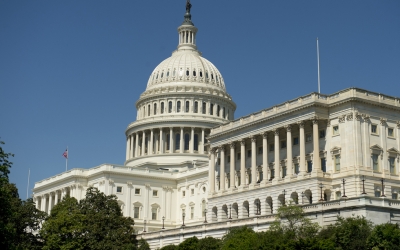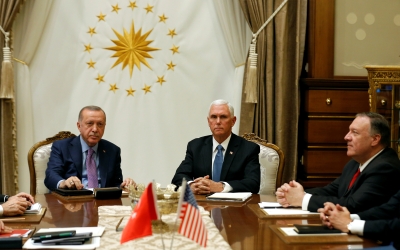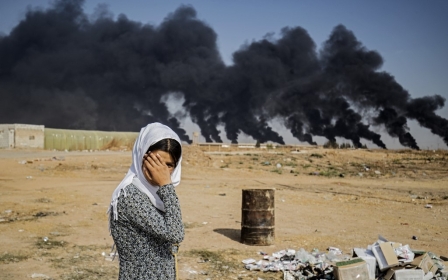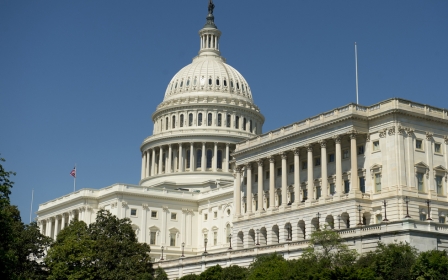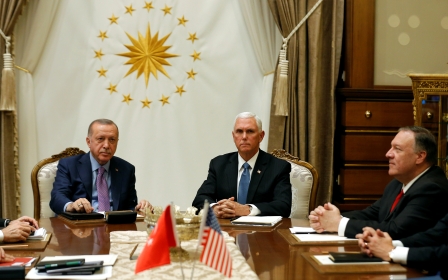Erdogan to 'crush heads' of Kurdish fighters if they do not withdraw from 'safe zone'
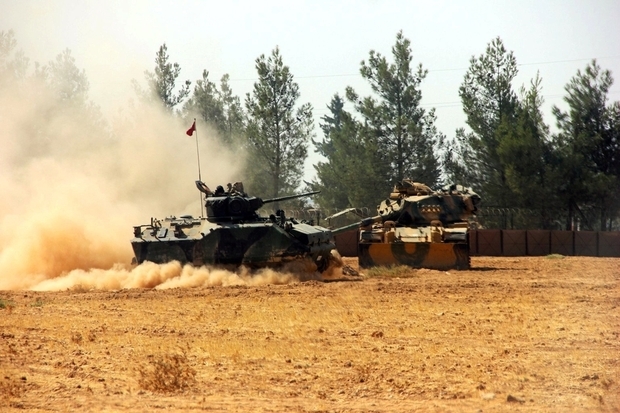
A fragile ceasefire was holding along Turkey's border with Syria on Saturday, two days after Turkish President Recep Tayyip Erdogan agreed to a 120-hour truce to allow Kurdish forces time to pull back from Ankara's cross-border assault.
Speaking at an opening ceremony in the central Turkish province of Kayseri, Erdogan said Turkey would "crush the heads" of Kurdish militants if they did not withdraw from a stipulated "safe zone" in northern Syria during the allotted time.
"If the promises that were made to us are not kept, we will not wait like we did before, and we will continue the operation where it left off once the time we set has run out," he said on Saturday.
Erdogan agreed to the truce during talks in Ankara on Thursday with US Vice President Mike Pence amid a humanitarian crisis that has put hundreds of thousands of civilians to flight and raised fears that thousands of Islamic State (IS) group captives guarded by Kurdish forces could escape.
Turkey's defence ministry said on Saturday there had been 14 "provocative attacks" from Syria in the past 36 hours but said it was continuing to coordinate closely with the United States to allow the agreement to be implemented.
New MEE newsletter: Jerusalem Dispatch
Sign up to get the latest insights and analysis on Israel-Palestine, alongside Turkey Unpacked and other MEE newsletters
Reuters journalists at the border said bombardment heard near the Syrian border town of Ras al-Ain on Friday morning had subsided.
The reporters said they saw just a few Turkish military vehicles crossing the frontier on Saturday morning.
Erdogan said on Saturday he would discuss the deployment of Syrian government forces in the planned safe zone during talks with Russia's President Vladimir Putin next week, but warned Ankara would "implement its own plans" if a solution was not reached.
The Turkish president will visit Sochi for emergency talks with Putin on what steps to take next.
The two leaders have forged close ties over defence and energy cooperation, as well as efforts to find a political solution in Syria, but Moscow has said the Turkish offensive was "unacceptable" and should be limited.
Time limit
The truce sets out a five-day pause to let the Kurdish-led Syrian Democratic Forces (SDF) militia pull out of the safe zone Turkey has vowed to create in territory extending more than 30km deep into Syria.
Ankara regards the People's Protection Units (YPG), the SDF's main component, as a terrorist group because of its links to Kurdish rebels operating in southeast Turkey.
Turkey's defence ministry said Defence Minister Hulusi Akar had urged his US counterpart, Mark Esper, in a telephone call late on Friday to ensure that YPG forces withdrew from the zone within the 120-hour period agreed under the truce.
Erdogan said on Friday the safe zone would run for some 440km from west to east along the border, though the US special envoy for Syria said the accord covered a smaller area where Turkish forces and their Syrian rebel allies were fighting.
Erdogan also said Turkey would set up a dozen observation posts across northeast Syria.
The surprise deal to suspend Turkey's military offensive against Kurdish-led forces in Syria hinged on Erdogan's demand that Washington agree a time limit on any ceasefire, a senior Turkish official told Reuters on Friday.
Turkey on Saturday denied Kurdish forces' claim that Ankara is blocking their pullout from a proposed safe zone along the border under a US-brokered agreement, AFP reported.
The commander of Kurdish forces in Syria, Mazloum Abdi, earlier Saturday accused Ankara of sabotaging the agreement with Washington by blocking the withdrawal of his forces from a flashpoint border town in northeastern Syria.
Assad meeting
Thursday's deal was aimed at easing a crisis triggered by President Donald Trump's abrupt decision earlier this month to withdraw all 1,000 US troops from northern Syria.
That move was widely criticised in Washington and elsewhere as a betrayal of loyal Kurdish allies who had fought for years alongside US troops against IS.
Trump's move also means the extent of Turkey's ambitions in the region is likely to be determined by Russia and Iran, filling the vacuum created by the US retreat.
Syrian President Bashar al-Assad, backed by Moscow and Tehran, has already deployed his forces in territory formerly protected by Washington, invited by the Kurds.
Erdogan, who has backed rebels fighting to oust Assad, has said Turkey has no problem with Syrian government forces deploying near the border.
On Saturday, Russia's foreign ministry said a delegation of Russian officials had met Assad in Damascus on Friday and discussed with him the need to de-escalate the situation in northeast Syria.
Trump defended his decision to pull US forces out of Syria as "strategically brilliant" and said the truce reached with Turkey on Thursday would save millions of lives.
Trump later said he held a phone call with Erdogan, adding that the Turkish leader "very much wants the ceasefire, or pause, to work".
Turkey says the safe zone will allow up to two million Syrian refugees - roughly half the number it is currently hosting - to settle in Syria, as well as pushing back the YPG militia from its border with Syria.
Middle East Eye delivers independent and unrivalled coverage and analysis of the Middle East, North Africa and beyond. To learn more about republishing this content and the associated fees, please fill out this form. More about MEE can be found here.


